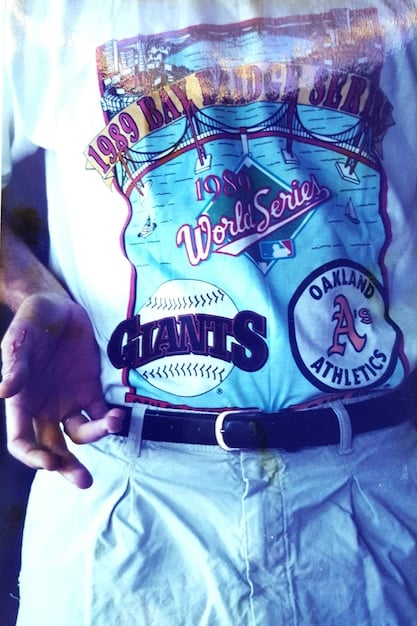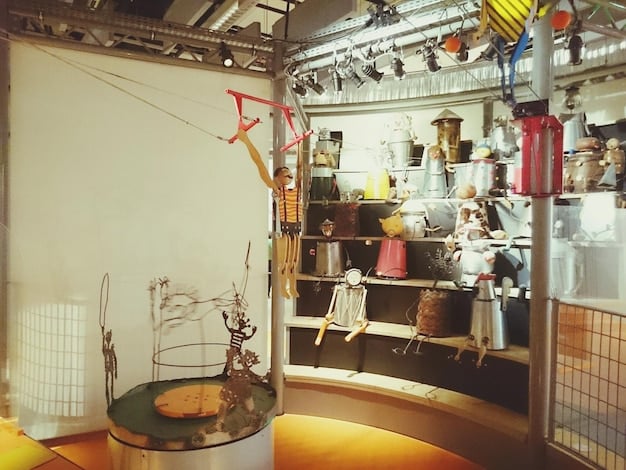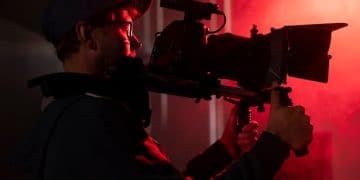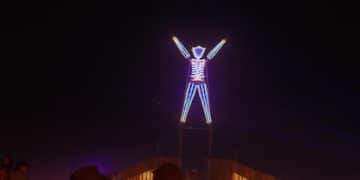Concert Merch Mania: Spotting Authentic Items & Avoiding Fakes

Concert merch mania is real, but so are the counterfeits; this guide provides key insights into identifying authentic items and avoiding scams to ensure you’re only taking home genuine memories from your favorite artists’ shows.
The thrill of a live concert often extends beyond the music, with fans eager to snag a piece of memorabilia. But how do you navigate the world of concert merch mania and ensure you’re buying authentic items, not cheaply made counterfeits?
Concert Merch: A Collector’s Item or a Scam?
Concert merchandise has evolved from a simple souvenir to a valuable collector’s item. Understanding the difference between authentic merch and counterfeit goods is crucial for any concert-goer looking to preserve their memories.
The Allure of Concert Merch
For many, concert merch is more than just a t-shirt or a poster. It’s a tangible connection to an unforgettable experience. The item serves as a reminder of the energy, the music, and the shared moments with fellow fans.
The Growing Market for Counterfeit Merch
Unfortunately, the popularity of concert merch has also attracted counterfeiters. These individuals produce low-quality replicas and sell them as authentic items, both online and near concert venues. This not only defrauds fans but also hurts artists and official merchandise vendors.

To protect yourself, it’s important to know what to look for. Here are some key differences between official and fake merch:
- Quality of Materials: Authentic merch typically uses high-quality fabrics and materials, whereas counterfeits often use cheap alternatives.
- Print Quality: Official merch boasts sharp, clear prints that won’t fade or peel easily. Counterfeit prints are often blurry, pixelated, or prone to cracking.
- Licensing and Copyright: Check for official licensing information on tags or labels. Counterfeit items often lack these details or have inaccurate information.
- Price Point: If the price seems too good to be true, it probably is. Authentic merch reflects the quality of materials and production, while counterfeits are priced low to attract unsuspecting buyers.
By being aware of these differences, you can increase your chances of buying authentic concert merch and avoiding disappointment.
Where to Buy Authentic Concert Merchandise
Knowing where to buy concert merch is just as important as knowing what to look for. Authentic merchandise is usually sold at specific locations during and after the event.
Official Concert Venues
The most reliable place to purchase authentic concert merch is directly at the official merchandise booths inside the concert venue. These booths are authorized by the artist and their management team, ensuring that the products are legitimate and of good quality.
Artist’s Official Website
Many artists have official websites where they sell merchandise online. Buying directly from the artist’s website guarantees that you are getting authentic items and supports the artist directly. These websites also often offer exclusive items that are not available at concert venues.
Authorized Retailers
Some artists partner with authorized retailers to sell their merchandise. These retailers have a licensing agreement with the artist and are verified to sell only authentic products. Check the artist’s website for a list of authorized retailers.

Places to avoid when buying concert merchandise:
- Street Vendors: Street vendors selling merch outside the venue often sell counterfeit items.
- Unofficial Online Marketplaces: Websites that are not authorized retailers or the artist’s official website are likely to sell fake merch.
- Social Media Ads: Ads on social media platforms that promote concert merchandise should be approached with caution, as many of these ads lead to counterfeit products.
By sticking to official sources, you can minimize the risk of purchasing fake concert merchandise and ensure that you are supporting the artist.
Spotting Red Flags: Identifying Counterfeit Items
Identifying counterfeit concert merchandise requires a keen eye and attention to detail. Recognizing the red flags can save you from wasting money on fake items.
Poor Quality Materials
One of the most obvious signs of counterfeit merchandise is the use of poor-quality materials. Counterfeit t-shirts often use thin, scratchy fabric that feels uncomfortable against the skin. Authentic merch is typically made from soft, durable materials that are designed to last.
Low-Quality Print
Counterfeit prints are often blurry, pixelated, or prone to fading and cracking. The colors may look dull or washed out, and the design may be misaligned. Authentic merchandise features high-quality prints that are sharp, vibrant, and durable.
Incorrect Sizing and Fit
Counterfeit clothing items may have incorrect sizing and fit. The sizes may run small or large compared to standard sizing charts. Authentic items are designed to fit true to size, with consistent measurements across different sizes.
Missing or Inaccurate Tags
Authentic concert merchandise will have tags with the artist’s name, copyright information, and licensing details. Counterfeit items may lack these tags or have inaccurate information. Check for misspellings, incorrect dates, or missing logos.
Unusually Low Prices
If the price of the merchandise seems too good to be true, it’s likely a red flag. Counterfeiters often sell their products at significantly lower prices to attract unsuspecting buyers. Authentic merch reflects the quality of materials and production, so it will typically be priced higher.
Packaging Issues
The way merchandise is packaged can also be an indicator of authenticity. Authentic items are often packaged neatly with proper labeling. Counterfeit items may come in plain plastic bags or have poorly designed packaging.
By paying attention to these red flags, you can avoid falling victim to counterfeit merchandise and ensure that you are getting genuine products.
Protecting Yourself Online: Tips for Safe Online Shopping
Online shopping offers convenience, but it also carries risks. Protecting yourself when buying concert merch online is essential to ensure you receive authentic items.
Buy from Official Websites
The safest way to buy concert merchandise online is directly from the artist’s official website. These websites are authorized to sell authentic products and often offer exclusive items that are not available elsewhere. Look for the official logo and secure payment options.
Check for Secure Payment Options
When making online purchases, ensure that the website uses secure payment options. Look for the padlock icon in the address bar and “https” in the URL. These indicators mean that your payment information is encrypted and protected from hackers.
Read Product Descriptions Carefully
Before buying any item online, read the product description carefully. Check for details about the materials, sizing, and licensing information. If the description is vague or missing important details, it may be a sign of counterfeit merchandise.
Read Reviews and Ratings
Check for reviews and ratings from other customers before making a purchase. Positive reviews can indicate a reliable seller, while negative reviews may warn you about potential issues with the product or the seller.
Beware of Social Media Ads
Be cautious of ads on social media platforms that promote concert merchandise. Many of these ads lead to counterfeit products or scam websites. Verify the seller’s legitimacy before clicking on any links or making a purchase.
Use Reputable Online Marketplaces
If you choose to buy from an online marketplace, stick to reputable platforms that have buyer protection policies. These policies can help you get a refund if you receive counterfeit merchandise or if the product is not as described.
By following these tips, you can minimize the risk of buying fake concert merchandise online and ensure that you are getting genuine products.
What to Do If You Suspect You’ve Bought a Fake
Discovering that you’ve purchased counterfeit concert merchandise can be frustrating. Knowing how to respond can help you recover your money and prevent others from being scammed.
Contact the Seller
The first step is to contact the seller and explain that you believe you have received a counterfeit item. Provide them with details about why you suspect the merchandise is fake, such as poor quality materials, low-quality print, or missing tags. Request a refund or an exchange for an authentic item.
File a Complaint with the Online Marketplace
If you bought the merchandise from an online marketplace, file a complaint with the platform. Most reputable marketplaces have buyer protection policies that can help you get a refund if you receive a counterfeit item. Provide them with evidence, such as photos and descriptions of the issues.
Report to the Artist or Their Management
Inform the artist or their management team about the counterfeit merchandise. They can take action to protect their brand and prevent further sales of fake items. Provide them with details about where you bought the merchandise and any information you have about the seller.
Leave a Review
Leave a review on the seller’s page or on the online marketplace to warn other potential buyers about the counterfeit merchandise. Be honest and specific about your experience to help others make informed decisions.
Dispute the Charge with Your Credit Card Company
If you are unable to get a refund from the seller or the online marketplace, dispute the charge with your credit card company. Provide them with evidence that you received a counterfeit item and that you have attempted to resolve the issue with the seller.
Report to Law Enforcement
In some cases, selling counterfeit merchandise is a violation of copyright laws. Report the seller to law enforcement agencies, such as the Federal Trade Commission (FTC) or the Internet Crime Complaint Center (IC3). Provide them with all the information you have about the seller and the counterfeit merchandise.
By taking these steps, you can protect yourself and help prevent others from falling victim to concert merch scams.
The Future of Concert Merch: Trends and Innovations
The world of concert merchandise is constantly evolving, with new trends and innovations emerging to meet the demands of fans and artists. Staying informed about these developments can help you make smarter purchasing decisions.
Sustainable and Eco-Friendly Merch
Many artists are now focusing on sustainable and eco-friendly merchandise options. These items are made from recycled materials, organic cotton, and other environmentally friendly resources. By choosing sustainable merch, you can support the artist’s commitment to environmental responsibility.
Digital Merchandise
Digital merchandise is becoming increasingly popular, with artists offering digital albums, live concert recordings, and exclusive content as part of their merch packages. These digital items can be accessed online and provide a unique way to connect with the artist.
Interactive Merch
Interactive merchandise allows fans to engage with the artist in new and exciting ways. These items may include QR codes that unlock exclusive content, augmented reality experiences, or personalized messages from the artist.
Limited Edition and Exclusive Items
Limited edition and exclusive items are highly sought after by collectors. These items are produced in limited quantities and are often only available at specific events or through exclusive online promotions. They offer fans a unique opportunity to own a rare piece of memorabilia.
Personalized Merch
Personalized merchandise allows fans to customize their items with their name, initials, or a special message. These personalized items make great gifts and provide a unique way to show your support for the artist.
As the concert merch landscape continues to evolve, staying informed about these trends and innovations can help you make informed decisions and enhance your concert experience.
| Key Point | Brief Description |
|---|---|
| ✅ Official Venues | Buy merch at official concert venues for guaranteed authenticity. |
| 🔍 Check Quality | Inspect fabric, print, and tags to spot low-quality fakes. |
| 💻 Secure Online | Shop from artist’s official sites and check for secure payment options. |
| 💰 Report Fakes | Report counterfeit merch to protect artists and other fans. |
Frequently Asked Questions
Check the fabric quality, print details, and official tags. Authentic shirts use durable materials and high-quality prints. Look for copyright information and licensing details on the tags.
The safest option is the artist’s official website. These sites are authorized to sell authentic products and often offer exclusive items not found elsewhere. Always check for secure payment options.
Contact the seller immediately for a refund or exchange. If that doesn’t work, file a complaint with the online marketplace and dispute the charge with your credit card company. Report the issue to the artist.
No, street vendors are often the source of counterfeit merchandise. It’s best to avoid them entirely and stick to official merchandise booths inside the concert venue or the artist’s official website.
Watch for poor fabric, blurry or faded prints, missing or incorrect tags, and unusually low prices. These are all indicators of counterfeit merchandise. Trust your instincts if something seems off.
Conclusion
Navigating the world of concert merch mania can be exciting, but it’s essential to stay vigilant and informed. By knowing where to buy authentic items, spotting red flags, and protecting yourself online, you can ensure that your concert memorabilia is genuine and supports the artists you love.





